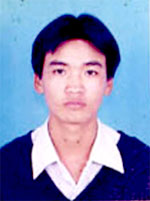




Official news reports said Judge Nguyen Xuan Phat of Ho Chi Minh City's Supreme Court of Appeals upheld the sentences of the four activists—Tran Thi Le Hong, Phung Quang Quyen, Doan Van Dien, and his son Doan Huy Chuong—to jail terms ranging from 18 months to 4-1/2 years.
The four were accused of collecting complaints of government land-rights violations and passing them on to RFA and other news organizations, as well as distributing anti-government leaflets at a meeting in Hanoi before the Asia-Pacific Economic Cooperation (APEC) summit in November 2006.
They were sentenced under Article 258 of Vietnam's penal code, which bars "abusing democratic freedoms to infringe upon the interests of the State."
The group was linked to the United Workers-Farmers Organization (UWFO), part of a new dissident movement that calls itself Bloc 8406. UWFO, banned in Vietnam, was formed ahead of the November 2006 Asia-Pacific Economic Cooperation (APEC) summit in Hanoi. The group has campaigned for the right to form independent labor unions and defended farmers whose land has been confiscated.
Vietnamese authorities have jailed as many as 12 dissidents associated with Bloc 8406 over the last year for allegedly spreading propaganda against the Vietnamese state.
Ho Thi Thuong, wife of Doan Van Dien, also known as Nguyen Tan Hoanh, and mother of Doan Huy Chuong, said she learned about the appeals case from her husband when she visited him in jail.
“At the trial, the court said the sentence of four years, six months in jail wasn’t heavy because Mr. Dien had answered [in] interviews with RFA,” Thuong said. “That is to say he defamed the government of Vietnam, and many people had listened… It's a serious crime.”
“The reason why the appellate court kept the same sentence for Nguyen Tan Hoanh and his comrade Tran Thi Le Hong was that they had [given] interviews to RFA as well,” she said. Thuong said the U.S. Consulate phoned her frequently asking for information. On one recent occasion, she said, an official from the U.S. Consulate and an interpreter visited her, accompanied by four police officers.
The court said the sentence of four years, six months in jail wasn’t heavy because Mr. Dien had answered [in] interviews with RFA. That is to say he defamed the government of Vietnam, and many people had listened… It's a serious crime.
The four were sentenced at trial in December 2007 for “spreading distorted information to undermine the state.”
According to the English-language daily Vietnam News , the defendants slandered the Vietnamese state on a U.S.-based “reactionary Web site” and distorted facts by telling Radio Free Asia that Vietnam represses workers and arrests demonstrators.
The official Communist Party Web site reported that the four were sentenced for “taking advantage of democratic freedoms to infringe on the state’s interests and the legitimate rights and interests of organizations and citizens, based on article 258 of the Criminal Code.”
“The jury rejected the appeals of the four defendants and sentenced Doan Van Dien to 4 years and 6 months in prison, Tran Thi Le Hong to three years, and Doan Huy Chuong and Phung Quang Quyen six months….[In 2006] Dien arranged for his son to pretend to be a worker to grant a telephone interview to Hoa Mai Radio and Radio Free Asia. In the interview, he distorted the truth. He also assumed [a] false identity as a Vietnamese worker to draft documents fabricating and slandering the state to send to the U.S.”
In its 2008 annual report, Reporters Without Borders (RSF) said Hanoi in 2007 continued “a relentless battle against opposition movements and dissident publications… Legislative elections in May 2007 served as an occasion for the sole party to remind the opposition that it had no right to exist.”
Vietnamese President Nguyen Minh Triet, replying in May 2007 to a question about human rights, said: “Perhaps it is hard for you to understand the love that we have for the people and the love that we have for human rights. But people who break the law must be punished.”
Original reporting by RFA's Vietnamese service. Service director: Diem Nguyen. Executive producer: Susan Lavery. Edited and produced in English by Sarah Jackson-Han.